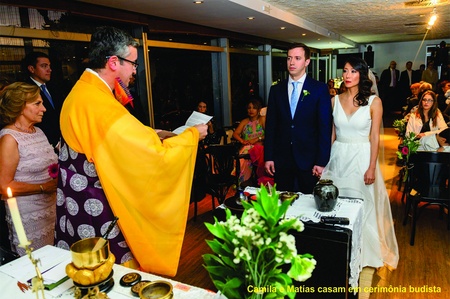Matías, who happens to be our Argentine son-in-law, the first time he was at our house he was welcomed with a lunch beautifully prepared by Cecília, my wife. At the table, invited to start the meal, he made a comment that immediately earned him positive points with his family. He said: “The Japanese bow – itadakimasu – before meals, which I consider to be a most significant attitude!” and added: “I traveled to Japan a few times for work and, every time I heard this expression said by the Japanese in restaurants, I was amazed. What would be the meaning? I thought.”
And, on that occasion, right after the comment he made, with the ease of a native, he put his hands together, bowed his head and said firmly: Itadakimasu! The other guests, the whole family, including my granddaughters, faced with the guest's unusual but elegant gesture, followed him to say in unison: “ Itadakimasu!!!“.
Matías knew that this attitude was part of Japanese customs and gastronomic etiquette.
But, curious as he was and an admirer of Japanese culture, he was not satisfied with just the explanation given to him the first time he visited Japan. Talking to several natives and researching on his own, he learned that this simple gesture that had so much appealed to him Attention, it had roots in Buddhist and Shinto principles that intensely influenced the culture and way of being of the Japanese. As was evident in the respect that the population has for all living beings and which represents, strictly speaking, a form of gratitude to the animals and plants that sacrificed themselves so that they could enjoy the meal. Thank you also involves all those who contributed to the food reaching your table, including farmers, producers, fishermen and those who prepared the food.
There is a Japanese saying that emphasizes and summarizes gratitude for all the elements that make up each day's food:
Okomehitotsubu hitotsubu ni wa, nana-ri no kamisama unde iru. Which comes to be: “7 Gods live in a single grain of rice. “
It became known that Along with the expression Itadakimasu , which can be understood as “gratitude for receiving food”, another is said after meals. It is the term Gochisosama, which would be “thank you for the meal”. The two greetings are said individually, in a low voice or in silence, accompanied by joined hands as if it were a prayer. Such gestures can be compared to the Christian tradition of praying before meals in gratitude to God for the food received.
All this symbolism, based on Buddhist philosophy, seeks to highlight the value that the Japanese place on food and the need to avoid waste. You should never leave food on your plate. All life is sacred, even a grain of rice!
Still on his pilgrimage, Matías found himself surprised by the richness of nuances of Japanese culture with deeply rooted values that are transmitted in everything they do and enchant in every moment and corner you visit.
One of them is DISCIPLINE. The image we have of the Japanese as being an intelligent and organized people has more to do with attitudes than with genetics. Discipline seems to be born with them, but it is also taught from an early age, within the home, in schools and by society itself. It's already part of the Japanese way of being. A characteristic that can be seen with great emphasis on education. Teaching is highly valued. Young people stand out for their dedication to studies, which they do without a feeling of obligation, because they understand that it is important for themselves.
And this DISCIPLINE applies to any other area of life, not just education. In professional life, family life, sports, personal projects, relationships, among others.
Respect in traffic, towards pedestrians; Clean streets and sidewalks, strict order in queues, punctuality in appointments, are some examples of the attitude of Japanese citizens.
Another characteristic that stands out is HIERARCHY, taught to young people at school, where they learn to respect older people, parents and teachers. A value that is replicated in life in society, in the way of relating, of talking to a friend, the boss or director. Respect, that is, hierarchy, is taken very seriously in Japan.
COLLECTIVE SPIRIT. Unlike Western countries, which are more individualistic, Japan lives in a more collective way. As a country is subject to natural disasters, such as earthquakes, typhoons, tsunamis, children already learn to care about others, to work collectively, to help each other.
Take the example of children being responsible for cleaning their own classrooms; or the neighborhood coming together to clean the streets and parks. Or, in the tragedy of the tsunami in Fukushima, where the spirit of collective and solidarity was present, helping to alleviate the pain of survivors.
A concept that has caught the attention of Westerners is OMOTENASHI which, in short, is hospitality or the art of welcoming.
But it's something deeper, that comes from within people. It is an attitude of transparency, in which nothing is expected in return, just the pleasure of serving well to the full satisfaction of those receiving the service.
Omotenashi is as if it were an obvious, natural thing for the natives, as if it were already part of their way of being. But for foreigners it can enchant and cause astonishment.
It can be represented in several ways, such as the punctuality of public trains, the cleanliness of common spaces, the kindness of employees in stores, hotels and airports; the white glove of taxi drivers, the failure to charge tips.
Its application can even be seen in business activities, in sectors such as “customer service, after-sales” in the commercial area.
Certainly, the privileged visitors to the Tokyo Olympic Games in 2021 will see on site what Omotenashi is all about.
To conclude this text, it is necessary to mention one of the most admired values, which is IKIGAI, which is, roughly speaking, the Japanese secret to a long and healthy life.
According to neuroscientist Ken Mogi, “ Ikigai is the reason for living ”. It's the reason that makes you wake up every day happy and willing.
The concept emerged in Okinawa, in southern Japan, famous for its natural beauty and lively and hospitable people. And due to the longevity of its population, which has an above-average life expectancy, even by Japanese standards.
In turn, writer Miralles defines ikigai as “the happiness of always having something to do, of feeling busy and that gives meaning to your life. It keeps you going and keeps you motivated.”
The beauty of ikigai is that it is very personal, says Mogi. “It’s not something given to you, passively. You need to explore your mind and seek your ikigai ,” he says.
But for that there is no need to move to Okinawa. You just need to understand the essence of the concept and make it part of your daily life.
With the good pleasure of the readers, I will allow myself to add, at the last minute, due to this terrible pandemic that is ravaging the world, another aspect of Japanese tradition, a little more recent, but which has a lot to help, as soon as we return to our homes. normal activities. It is the practice of SHINRIN YOKU.
Faced with the stress and sedentary lifestyle we are forced into these days, practicing Shinrin Yoku brings countless benefits to our health. Health is a phenomenon that involves physiological, psychological and social aspects. In this sense, a Japanese tradition values contact with nature and shows that it has therapeutic properties and is very good for your health. This concept is called Shinrin Yoku , which literally means “the act of making contact and being in the atmosphere of the forest”. Or, simply, “forest bathing”!
The effect caused by the forest environment, this connection between man and nature, through a leisurely walk through the forest, the woods or even a wooded park, where the person can smell the trees, the earth, the plants and flowers and hearing the sounds of birds, branches snapping and the wind, involving the 5 human senses, does a lot of good.
According to scientists, it improves the immune system, reduces blood pressure, anxiety, depression and stress and, consequently, brings people well-being. Very necessary and extremely important at this time we are living in, the coronavirus pandemic.
Ultimately, Japanese culture is multifaceted, with an ancient tradition, full of fascination and enchantment, which presents many other characteristics and values, each with its own meaning and importance. I would like to suggest that dear Matías delve deeper into the research. I'm sure you won't regret it!
PS: Camila and Matías, some time later, got married in a Buddhist ceremony.
© 2020 Katsuo Higuchi






